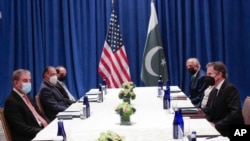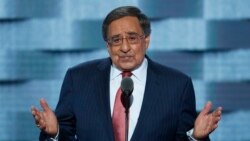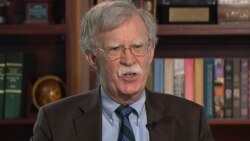Former U.S. officials say the withdrawal of U.S. coalition forces from Afghanistan has changed the political calculus of U.S.-Pakistan relations, making Washington less reliant on Islamabad when it comes to counterterrorism activities.
In a recent interview with VOA’s Urdu Service, former U.S. Defense Secretary Leon Panetta said the U.S.-Pakistan relationship has always been complex.
“We would try to build a cooperative relationship with them (Pakistan) particularly when al-Qaida was located in the tribal areas of Pakistan," Panetta said of his time as CIA director under former President Barack Obama. "As long as we kept them informed, as long as we continued to work with them, they gave us some cooperation."
At the same time, Panetta said, Pakistan has maintained relationships with terrorist groups for leverage against India and has been very close to the Taliban and the Haqqani network — which the U.S. considers a terrorist group — contributing to a lack of trust between the two nations.
Pakistan's National Security Adviser Moeed Yusuf disagrees with the assessment and says Washington and Islamabad are engaged in a positive dialogue. He notes as an example U.S. Deputy Secretary of State Wendy Sherman’s recent visit to Pakistan.
"There is some mistrust that both sides have to overcome, and we are trying to do that, and that is also the reason why she (Sherman) came to Pakistan," Yusuf recently told VOA. "The two countries are moving forward in a well-coordinated fashion, and there is no major crisis."
Concerns about terrorism and Pakistan’s nuclear arsenal
Panetta and John Bolton, former national security advisor to then-President Donald Trump, both tell VOA they have significant concerns regarding the security of Pakistan's nuclear arsenal. They cite the regional presence of Islamic State-Khorasan, al-Qaida, the Pakistani Taliban in Afghanistan, and the Taliban’s recent seizure of power in Afghanistan.
“The Taliban's successful takeover of Afghanistan has significantly boosted radical ideology within the Pakistani government, TTP (Tehrik-e-Taliban Pakistan), and terrorists inside Pakistan,” Bolton told VOA in a recent interview.
"I'm worried that not only would there be a deliberate policy by the government of Pakistan at that point to transfer nuclear weapons to terrorists or to those who would have the money to pay for them."
According to Bolton," the main point is that the nuclear capability, a fragile state in Pakistan, let alone the failed state, would significantly increase the risk of these nuclear weapons falling into dangerous hands."
Former Defense Secretary Panetta voiced similar concerns in his interview with VOA.
"One of our great concerns, when I was director of the CIA, was whether or not a terrorist group would be able to acquire a nuclear weapon of some kind in Pakistan, we were never convinced that it was a secure system," said Panetta.
Pakistani National Security Advisor Yusuf insists there is no reason for concern about the security of Pakistan’s nuclear weapons.
“Pakistan's nuclear arsenal by the grace of God have always been safe and will always remain safe, and if anyone wants to lose sleep over it, it's their choice."






